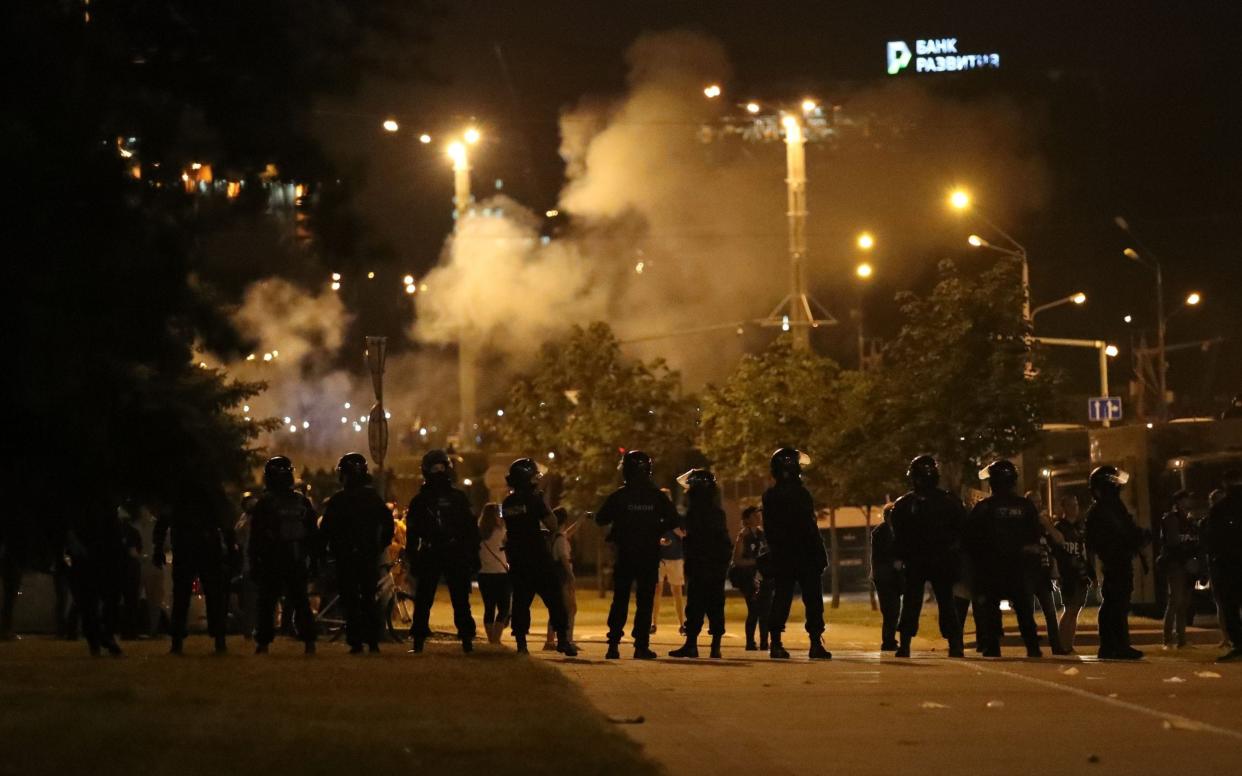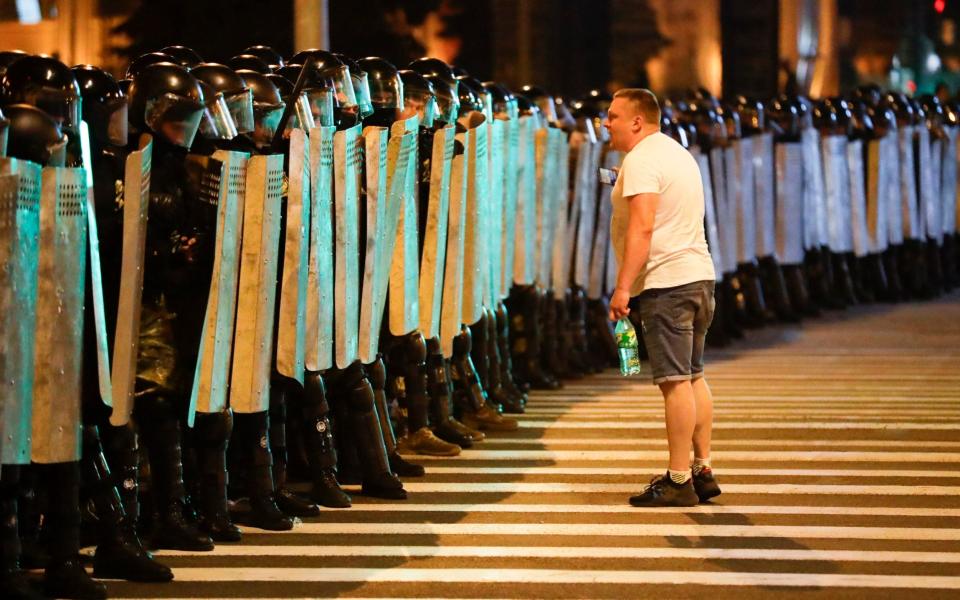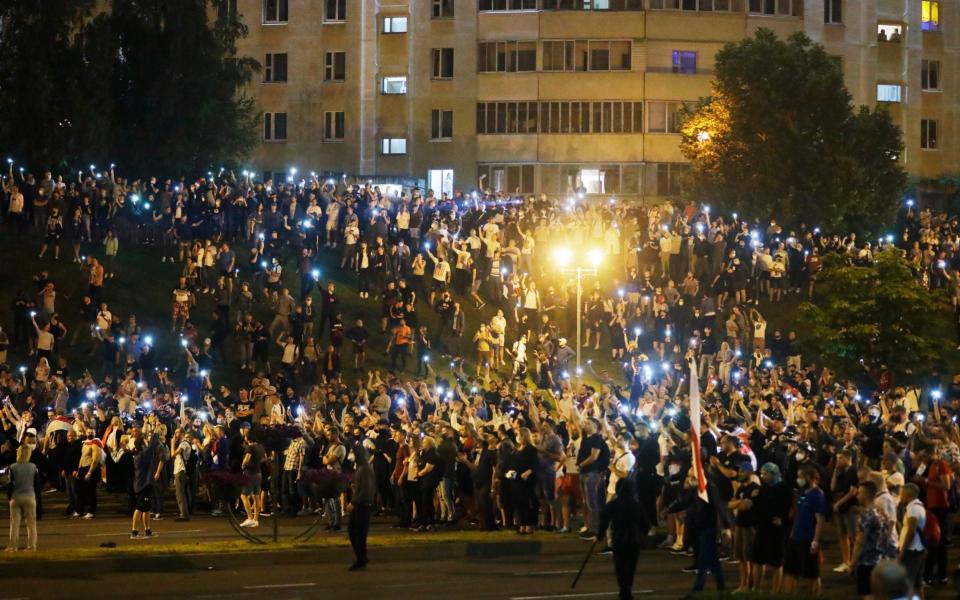Belarus' authoritarian leader projected to win elections by landslide as protests erupt

Phalanxes of Belarusian police in full riot gear violently dispersed thousands of demonstrators who poured into the streets to challenge the early count from Sunday's presidential election indicating the longtime authoritarian leader won a sixth term by a landslide.
Hundreds of people were detained, according to a leading rights group.
The brutal crackdown that began late Sunday and lasted through the night followed a tense campaign that saw massive rallies against President Alexander Lukashenko, who has ruled the ex-Soviet nation with an iron hand for 26 years.
Mr Lukashenko was projected to win the country’s presidential election by a landslide in a campaign marred by suspected vote-rigging and arrests of opposition supporters.
After receiving votes from closed polling stations, the Belarus Central Election Commission said President Lukashenko had received 81 per cent of votes and his closest competitor Sviatlana Tsikhanouskaya eight per cent.
Thousands of people took to the streets of Minsk and other cities while protesters clapped, shouted "victory", waved flags and honked car horns in solidarity with the opposition. Some built barricades with garbage cans.
Police fired water cannons, tear gas and stun grenades in a crackdown on the protests.

At least one person was killed after being knocked over by a police prisoner van and dozens were injured, a representative of the rights group Spring 96 said on Monday.
"There are at least 120 detainees, but this is initial data," Valentin Stefanovic said.
After breaking up the big crowds, police relentlessly chased smaller groups of protesters across downtown Minsk for the next several hours.
Interior Ministry spokeswoman Olga Chemodanova said that police efforts to restore order were continuing overnight, but wouldn't say how many people were detained.
Anticipating a wave of anti-government protests, Mr Lukashenko, largely reliant on cheap Russian energy imports and powerful secret services, had dispatched thousands of police officers, troops and armoured vehicles around the capital Minsk to empty parts of the city centre of motorists and pedestrians.
Military trucks with police troops were tucked away in side-streets blocked from traffic. The military was patrolling highways leading into the nation’s capital. Even gates of many apartment buildings overlooking Minsk’s main road were locked and chained on Sunday morning.
With his main rivals either jailed or barred from running, Mr Lukashenko, 65, faced four other candidates including 37-year-old Mrs Tsikhanouskaya, the wife of an imprisoned YouTube blogger, who emerged as an unlikely face of the Belarusian protests.

Mrs Tsikhanouskaya’s campaign rallies across the country have attracted tens of thousands, debunking Mr Lukashenko’s claims of being a universally popular leader.
Polls have been open for early voting since Tuesday, and Belarusian election officials on Sunday morning reported a 42 percent turnout in what independent election observers called a sure sign of wide-spread rigging.
European election monitors, including the well-respected Organisation for Security and Cooperation in Europe, have not recognised a single election as free and fair since Mr Lukashenko came to power in 1994.
The group said earlier this summer that they did not receive a timely invitation from authorities and therefore would be unable to set up a monitoring mission in Belarus.
“Lukashenko has been in power for 26 years - how much longer?” Irina Ivanchikova, 29, told the Telegraph outside a polling station in Minsk. “We want a better future _ for ourselves and our kids.”
Alexei Yaloshevich, an independent election monitor, was sitting on a picnic chair just outside the polling station after election officials said there was no enough room for observers inside due to coronavirus precautions.
He and his colleagues counted just two-thirds of how many voters showed up at the polling station in early voting Tuesday to Thursday, according to election officials.

President Lukashenko, who has a history of blaming foreign powers for plotting to topple him, has dismissed the growing opposition movement as brainwashed foreign puppets and vowed to clamp down on what he described as illegal protests.
Mr Lukashenko told reporters after casting his ballot at a polling station in central Minsk that “the situation will not get out of hand.”
Mr Lukashenko dismissed suggestions that he uses security forces to retaliate against his political opponents: “They are not worth the effort of using any repressions against them.”
Authorities in recent days have been putting pressure on the opposition.
Seven of Mrs Tsikhanouskaya’s campaign staff were detained and jailed Saturday evening and Sunday morning, including her campaign manager Maria Moroz.
The Telegraph was there when Mrs Tsikhanouskaya fled her home in Minsk’s east on Saturday night after spotting suspicious men and fearing arrest.
Her ally Maria Kalesnikava was grabbed by security agents just outside the campaign quarters right after that only to be released a few hours later.
The internet connection across town appeared to be jammed throughout the day, with most of the popular messenger apps as well as Facebook and Twitter unavailable.

